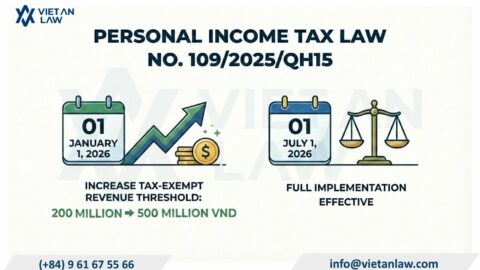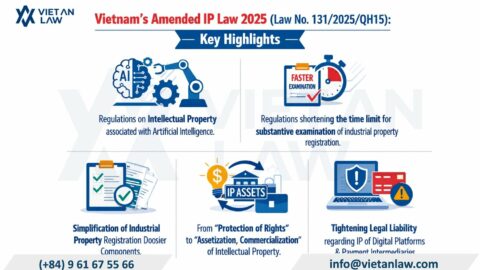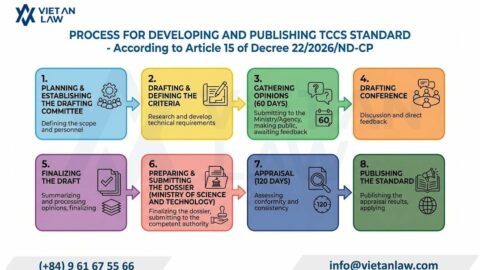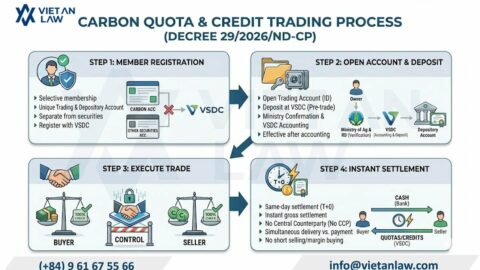In a context where Vietnam is strongly attracting high-quality human resources for key sectors such as digital transformation, innovation, finance, and high-tech, improving regulations on work permits is considered one of the “keys” to retaining and attracting international talent. Therefore, on August 7, 2025, the Government issued Decree 219/2025/ND-CP, which regulates foreign workers in Vietnam. This document replaces Decree 152/2020/ND-CP and Decree 70/2023/ND-CP, and is considered a significant step forward in administrative reform, simplifying procedures and increasing flexibility for businesses. The following article by Viet An Law will provide some new points of Decree 219/2025/ND-CP on foreign workers in Vietnam.
Table of contents
New points of Decree 219/2025/ND-CP
Based on Clause 3, Article 3 of Decree 219/2025/ND-CP, the conditions for issuing a work permit to experts no longer include the 3-year experience requirement. Instead, there is more flexibility:
Previously, the 3-year experience requirement made it difficult for many young experts, especially in technology, innovation, AI, and fintech, to enter the Vietnamese labor market despite having outstanding qualifications and capabilities. The new regulation helps open doors for young talent and is more flexible to the needs of developing high-tech sectors, where innovation is more important than seniority.
According to Article 4 of Decree 219/2025/ND-CP, the authority to issue, reissue, renew, revoke work permits, and confirmations of exemption from work permit requirements is as follows:
Previously, businesses had to work mainly with the Department of Labor, Invalids, and Social Affairs, and in many cases, had to seek opinions from the Ministry, which was time-consuming. Delegating authority to the Provincial People’s Committees helps speed up the handling of applications, clarifies responsibilities, and is consistent with the reality that most foreign workers are employed locally.
Clause 3, Article 6 of Decree 219/2025/ND-CP adds a simultaneous, integrated procedure for applying for both a work permit and a criminal record certificate on the National Public Service Portal.
Accordingly, employers are allowed to submit the following applications online at the same time:
This integrated procedure operates between the National Public Service Portal, the work permit issuing agency (under the Provincial People’s Committee), and the police agency that issues a criminal records certificate.
The results, including an electronic work permit and a criminal record certificate, are returned simultaneously through the National Public Service Portal.
In practice, foreign workers often face difficulties when having to obtain a criminal record check from their home country or through multiple domestic agencies. This new online, integrated procedure reduces costs, time, and risks, and promotes administrative digital transformation.
Article 7 of Decree 219/2025/ND-CP specifies 15 cases where foreign workers are exempt from the requirement for a work permit confirmation of exemption from the work permit requirement in Vietnam.
This includes the addition of cases where persons certified by ministries, ministerial agencies, or provincial People’s Committees to enter Vietnam to work in finance, science, technology, innovation, national digital transformation, or priority socio-economic development sectors.
These sectors are currently facing a shortage of high-quality human resources. This new regulation creates favorable conditions for foreign experts to participate in the development of key sectors and attracts high-tech FDI.
Specifically, Point a, Clause 13, Article 7 of Decree 219/2025/ND-CP states that foreign workers in Vietnam with a total working time of less than 90 days in one year (calculated from January 1 to December 31) are not required to have a work permit.
However, according to Clause 4, Article 9 of this Decree, the employer is responsible for notifying the competent authority responsible for issuing such confirmation in the province or city where the foreign worker is expected to work at least 3 days before such foreign worker starts to work in Vietnam.
Compared to the previous regulation in Clause 2, Article 7 of Decree 152/2020/ND-CP, which also exempted foreign workers from work permits if they worked for less than 30 days per visit and not more than 90 days per year, the new decree now mandates a notification.
Thus, the new regulation in Decree 219/2025/ND-CP is considered more flexible, creating favorable conditions for short-term foreign experts while still ensuring state management requirements through a prior notification mechanism.
According to Clause 4, Article 9 of Decree 219/2025/ND-CP, for cases specified in Clauses 4, 5, 6, and 8 of Article 154 of the Labor Code, and Clauses 2, 3, 5, 8, 10, and point a of Clause 13 of Article 7 Decree 219/2025/ND-CP are no need to carry out the procedure for issuance of confirmation of exemption from work permit requirement but:
Previously, workers and businesses had to report to the Ministry or Department, causing difficulties and a lack of consistency. Now, employers only need to notify the local authority, which reduces red tape while ensuring the state has management data.
Work permits can only be extended once according to Decree 219/2025/ND-CP
According to Article 29 of Decree 219/2025/ND-CP, a work permit can be extended a maximum of one time, for a duration not exceeding 2 years.
Previously, Clause 1, Article 19 of Decree 152/2020/ND-CP allowed for multiple extensions, leading to situations where people would circumvent the law to extend their stay without reassessing the actual need. The new regulation helps to tighten management, ensuring that only genuinely necessary workers are allowed to stay. However, this also forces businesses to have a clear human resource plan.
According to Clause 5, Article 22 of Decree 219/2025/ND-CP, If a foreign worker has already been issued a work permit and wishes to work for the same employer in multiple provinces or centrally affiliated cities, the employer must inform the competent authority in the province or city where the foreign worker is expected to work at least 3 days prior to the expected start date the necessary information.
This new regulation increases flexibility in personnel deployment, reduces the burden of procedures, and aligns with the nature of production and business operations that span across different locations.
Article 21 of Decree 219/2025/ND-CP stipulates that the validity period of work permits, confirmations of exemption from work permit requirements shall not exceed 02 years.
This duration is determined based on the validity period of relevant documents, including labor contracts, documents from the foreign party on sending the foreign worker to work in Vietnam, international agreements, business licenses, and other legal documents.
Compared to Clause 1, Article 10 of Decree 152/2020/ND-CP, which also sets a maximum of 2 years but does not specify the full range of grounds for determining the duration, the new decree helps to address issues that arose in practice, such as a lack of consistency in understanding and application among localities.
The addition and clarification of the grounds for determining the duration in Decree 219/2025/ND-CP contribute to ensuring transparency, consistency, and convenience in the application of the law.
According to Article 30 and Article 32 of Decree 219/2025/ND-CP, cases of revocation of work permits and confirmations of exemption from work permit requirements include:
Previous regulations were incomplete, making it difficult to handle violations. Compared to the old regulations, this section in Decree 219/2025/ND-CP has added and clarified the grounds for revocation, overcoming the issue of vague and incomplete regulations that made it difficult to handle violations. As a result, the new regulation helps to tighten discipline, ensure strict management, and prevent the misuse of work permits to stay and work illegally.
Overall, the new points of Decree 219/2025/ND-CP demonstrate two main trends:
This both attracts high-quality human resources and ensures labor security and management order, aligning with the goal of socio-economic development in the period of promoting digital transformation, attracting high-tech FDI, and gradually standardizing the management of foreign labor.
Above is the information on the issue of Decree 219/2025/ND-CP on foreign workers in Vietnam. Clients who have related questions or need legal support, please contact Viet An Law Firm for the best support!




